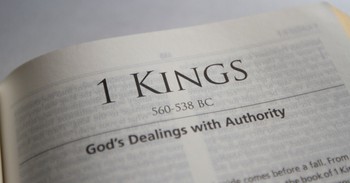King Jehu was the 10th king of the northern Kingdom of Israel and anointed by God to enact judgment against the house of Ahab for its wickedness. Though bold, zealous, cunning, and bloodthirsty by reputation, Jehu was nonetheless used by God to reform Israel and eradicate Baal worship from the nation.
For those who like to think of the Bible as merely a book of bedtime stories, ancient wisdom, and uplifting poetry, a brief overview of the history of Israel’s kings may provide a stark reminder that the history of Israel is a violent and often bloody saga of political turmoil, shifting power, deception, conflict, division, war, betrayal, and rebellion.
Through generations of sin and apostasy, God remained faithful to His people, offering mercy to the nation if they abandoned their idols and returned fully to Him. But as the kings of Israel and Judah led, so followed the people. We read in 1&2 Kings that most of Israel and Judah’s kings were abject, moral failures, who repeatedly “did evil in the sight of the Lord.”
In every way, the kings of Israel and Judah proved inadequate compared to the goodness and glory of Yahweh, the true king of Israel. However, despite their many shortcomings, God would use human kings and earthly rulers to judge His people, reform the nation, and lead of the hearts of the people back to their God, if only for a season.
Jehu was one of these kings.
Photo Credit: ©GettyImages/anthonyjhall
Who Was King Jehu?
Zealous, assertive, and politically cunning, Jehu was known for his acts of violence against the descendants of Ahab, effectively cutting off Ahab’s bloodline from Israel.
By comparison to the kings of Israel, Jehu is seen as a mostly “good king.” He was obedient to God’s command to destroy the house of Ahab and faithful to eradicate Baal worship from Israel. However, even Jehu receives an asterisk for failing to eliminate false worship in the “high places” at Bethel, which had been in practice since the days of Jeroboam.
The first mention of Jehu in the Bible is found in 1 Kings 19, following Elijah’s showdown with the prophets of Baal on Mount Carmel. After Baal’s humiliating defeat, Jezebel, the wicked wife of King Ahab, threatened swift retribution against Elijah (1 Kings 19:1-2).
In context, King Ahab is described in the Bible as one who did “evil in the sight of the Lord more than all who were before him” (1 Kings 16:30). His wife Jezebel was even more wicked and cruel, “inciting” her husband, and by proxy the nation, to worship Baal and follow the pagan practices of her people.
Ahab would go on to instate Baal as the official god of Israel over Yahweh. At this point, God had had enough. The cancer of idolatry had infected Israel so deeply, it needed to be expunged.
God would enact swift judgment on the house of Ahab and the nation of Israel using three key leaders, telling Elijah:
“you shall anoint Hazael king over Aram. You shall also anoint Jehu the son of Nimshi king over Israel; and you shall anoint Elisha the son of Shaphat of Abel-meholah as prophet in your place. And it shall come about that the one who escapes from the sword of Hazael, Jehu shall put to death, and the one who escapes from the sword of Jehu, Elisha shall put to death” (1 Kings 19:15-17).
God’s promise concerning Israel’s pending judgment would come to pass with the death of Ahab (1 Kings 22:20-40), who was succeeded by his son Ahaziah and later Jehoram (Joram).
While Jehoram waged war against Hazael at Ramoth-gilead, Elisha, the son of Shaphat, who had replaced Elijah as prophet to Israel, anointed Jehu, a captain in Israel’s army, as king over Israel (2 Kings 9:1-13). Here, all three leaders were set to the task they were anointed to fulfill.

What Did King Jehu Do in the Bible?
Knowing that King Joram had been retreated to Jezreel to recover from battle, Jehu swiftly ordered his men to surround the city to prevent Joram from learning of his (Jehu’s) anointing. Ironically, though not coincidentally, Ahaziah, the king of Judah and a descendent of Ahab, was in Jezreel visiting Joram at the time.
There, Jehu earned his reputation for decisive action and violence, killing King Joram of Israel and King Ahaziah of Judah in short order (2 Kings 9:14-29).
Joram’s body was then thrown into the field of Naboth in Jezreel, fulfilling what Elijah had spoken over Ahab when he murdered Naboth and stole his vineyard (1 Kings 21:22).
Ahaziah’s body was returned to Jerusalem, where it was buried with the kings of Judah (2 Kings 9:28).
And if you thought Jezebel, Ahab’s queen, had escaped God’s judgment, think again.
Shortly after Joram’s death, Jehu had Jezebel thrown from her balcony in the palace in Jezreel. By the time Jehu’s men went to bury the body, the Bible tells us, “they found nothing more of her than the skull and the feet and the palms of her hands.” (2 Kings 9:35). As prophesied by Elijah, the body of Jezebel had been eaten by the dogs (1 Kings 21:23-24).
From here, Jehu’s campaign against the house of Ahab was both swift and surgical.
Seventy sons of Ahab were sought out and destroyed by Jehu’s forces, all who had allied themselves to Ahab were struck down, and forty-two relatives of Ahaziah were also killed, removing the sin and stain of Ahab’s family from Israel forever (2 Kings 10:1-17).
Of course, Jehu’s reform did not stop with the house of Ahab.
In a shrewd act of political maneuvering, Jehu assembled the prophets, priests, and worshippers of Baal, promising that as Ahab had served Baal, he (Jehu) would worship Baal even more. Once he had gathered the prophets in the temple of Baal, Jehu proceeded to slaughter the prophets and priests of Baal, leaving none alive (2 Kings 10:18-25).
Jehu’s men then razed the temple of Baal, burning the sacred pillars and idols. Thus, Jehu “eradicated Baal out of Israel” (2 Kings 10:28).
For his faithfulness, four generations of Jehu’s sons would sit on the throne of Israel (2 Kings 10:30). However, the Bible tells us that, “Jehu was not careful to walk in the law of the Lord, the God of Israel, with all his heart; he did not depart from the sins of Jeroboam, which he made Israel sin” (2 Kings 10:31).
Jehu was blessed by God for his obedience, however, his neglect in removing the high places at Bethel proved costly, as the size of Israel gradually decreased and portions of the land God had promised to His people were surrendered to Hazael of Syria and other foreign leaders in the years that followed (2 Kings 10:32-33).
Jehu would reign for twenty-eight years in Israel (841-813 B.C.) and be succeeded by his son Jehoahaz (2 Kings 10:35-36).
The story of Jehu may seem like an odd, R-rated saga made for cable television, however, there are several important lessons we can learn from Israel’s kingslayer and zealous reformer. Here are 4 lessons we can learn from Jehu:
Photo Credit: ©GettyImages/Tomertu
1. The Path of Sin Is Never the Path of Peace
It’s safe to say that Jehu’s legacy was as violent as they come. However, though Jehu’s fury was known throughout Israel, Israel’s demise was brought about not by Jehu’s sword, but by Israel’s sin.
When Jehu caught up with Joram at Jezreel, the former king of Israel asked Jehu if he had come in peace. To this Jehu replied, “what peace? So long as the harlotries of your mother Jezebel and her witchcrafts are so many?” (2 Kings 9:22)
The wickedness of Ahab and sin of Israel had proven that the way of sin can never be the way of peace. There are consequences to sin and disobedience, and as the apostle Paul would later write, “the wages of sin is death” (Romans 6:23). Furthermore, through the prophet Isaiah, God reminded Israel that, “there is no peace for the wicked” (Isaiah 57:21).
Those who persist in sin will never find peace nor be at peace with God. Sin is the pathway to death and destruction. Peace on the other hand is reserved for those who fear the Lord, delight in His Word, and obey His commands.
2. God Is Sovereign and in Control
In hiding from Jezebel, Elijah cried out to the Lord, asking, how long would the wickedness of Ahab and Jezebel be allowed to persist? How long would he be an outcast among his people and ostracized for his faithfulness? In 1 Kings 19, God provided an answer to his complaint and a promise that He would soon judge His people and hold Israel’s leaders accountable for their wickedness.
What should we glean from this?
For one thing, God is sovereign and in control.
God had not forgotten Elijah, nor had He turned a blind eye to the sin of His people or faithfulness of His servants. He had a plan to bless Elijah and later Jehu; He also had a plan to cleanse Israel of its sin and bring to justice its wicked rulers. God’s timing, however, is always His own.

3. God Rewards the Faithful but Expects Complete, Not Partial Obedience
God would reward Jehu for His faithfulness in destroying the house of Ahab and eradicating Baal worship from Israel, however, as quickly as His blessings for obedience were given, they could be removed as quickly for disobedience.
The epilogue of Jehu’s life reminds us that Jehu’s obedience was partial and incomplete. Because He was not diligent in keeping to all of God’s commands and serve the Lord with all his heart, various forms of sin remained in Israel.
Jehu may have eradicated false worship, but that doesn’t mean his heart was right or he worshipped the Lord with all his heart. Jehu may have been a “good king” in the sense that he did what God had asked of him, however, like his predecessors, he failed to remove the “high places” at Bethel and limit sacrifice and worship to the temple in Jerusalem, as God had instructed (Deuteronomy 12:1-4, 1 Kings 9:3).
In the end, God expects total obedience from His followers and an exclusive relationship with those who call Him Lord. Partial obedience only leads to partial blessing, leaving room for even small, socially acceptable sin to spread if not challenged or destroyed.
4. God Anoints Those He Chooses
In anointing both Jehu and Hazael of Syria as instruments of judgment, God demonstrates that He anoints and equips those He chooses, not necessarily those we envision, admire, or look to in times of trouble.
Jehu may have been a bloodthirsty and sometimes ruthless killer, a trait God would remember and address in the days of the prophet Hosea (Hosea 1:4). Likewise, Hazael was a foreign adversary who frequently waged war against God’s people.
Scripture tells us, however, that even unlikely, imperfect rulers are established by God and used for His purposes (Romans 13, 1 Peter 2). Regardless of their intentions or inadequacies, God’s plan is far bigger and far greater than even the Jehu’s and Ahab’s of the world.
God anoints who He chooses and uses who He will for His purposes. Sometimes they are used to bless God’s people; other times they are used as instruments of judgment. In the end, all leaders are accountable to God. As Paul reminds us, “there is no authority except from God” (Romans 13:1).
That being said, the failure of earthly kings and the leadership of earthly rulers serves as a reminder that God alone is sovereign, God alone is just, and God alone is king. When He moves, we would be wise to align ourselves to His will and choose His side over all others. In Him alone there is life.
Further Reading
Photo Credit: iStock/Getty Images Plus/Yurii Kifor
Originally published August 31, 2021.








